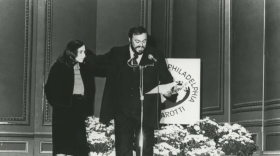
Bruce Hodges
Born in Princeton, N.J., Bruce Hodges grew up in Texas among a family of classical music fans and singers, and studied art, violin, and voice. Playlist, age 16: Berio Sinfonia, Reich Violin Phase, Riley A Rainbow in Curved Air, Nancarrow Studies for Player Piano, Partch Castor and Pollux, Kagel Der Schall.
At Antioch College he studied visual art with Jonathan Ahearn and music composition with David Stock, founder of the Pittsburgh New Music Ensemble. Bruce later earned a B.F.A. in drawing and painting from the University of North Texas, where he studied with Henry Whiddon and Claudia Betti. He moved to New York in 1981.
During the 1980s and 1990s he was executive director and board president of the New York Consortium for New Music (Continuum, Da Capo Chamber Players, ModernWorks, The New York New Music Ensemble, Newband, and Speculum Musicae), which from 1991 through 2002 produced Sonic Boom, “considered by some to be the country’s leading contemporary music festival.” (The New Yorker) During the 1990s, he was also president of the board of directors of Ensemble Sospeso, the new music ensemble that presented groundbreaking concerts of works by Pierre Boulez, Elliott Carter, Helmut Lachenmann, Tristan Murail, Wolfgang Rihm, and Iannis Xenakis.
He has interviewed composers Jason Eckardt, Toshio Hosokawa, Olga Neuwirth, and Agata Zubel, among others, for the Miller Theatre at Columbia University, the Look & Listen Festival, and the Austrian Cultural Forum.
A lifelong writer, from 2007 to 2015 Bruce wrote a column on recordings for The Juilliard Journal, and from 2003-2020 he wrote articles for Seen and Heard International (London), and served as its North American editor. Since 2012 he has written for The Strad, also based in London. He has also contributed articles to Lincoln Center, Playbill, New Music Box, London’s Southbank Centre, Strings, and Overtones, the magazine of the Curtis Institute of Music. He currently lives in Philadelphia.
Among wide-ranging interests, Bruce has a deep love for film, photography, contemporary art and architecture, cooking, and New Orleans jazz and food. He has also been known to craft the occasional sonnet.
-
Fanfare is jam-packed with stellar concerts this week, including the Curtis Opera Theatre's production of a Saariaho opera; Nathalie Joachim with a new evening-length work; and a monumental program by the Jasper String Quartet.
-
From a benefit organized by a world-class pianist to a starring role for a 2,000-year-old Chinese instrument, this weeks options in Fanfare reflect the diversity of the City of Brotherly Love.
-
This week's Fanfare features the Chamber Orchestra of Europe with violinist Veronika Eberle, the Lorelei Ensemble, the Julliard String Quartet with pianist Marc-André Hamelin and more.
-
Soprano Benita Valente, who died on Oct. 24 at 91, was a singular talent beloved worldwide and adored in Philadelphia. She leaves behind an interwoven legacy of musical excellence and cultural influence.
-
Luciano Pavarotti hailed from Modena, and the legendary tenor had a gift that belonged to the world. But he had a special bond with Philadelphia — and the city loved him back.
-
In this week's Fanfare, conductor Esa-Pekka Salonen returns to lead the Philadelphians in Bruckner's Fourth, the Jasper String Quartet debuts a commissioned work by Reinaldo Moya, The Crossing begins its 2025-2026 season and more.
-
An accomplished harpist and educator, Jill Pasternak led a distinguished career in radio, including 18 years at WRTI.
-
Eugene Ormandy spent more than 40 years at the helm of The Philadelphia Orchestra, and it can be easy to take his legacy for granted. But a major new boxed set renews his claim to artistic excellence.
-
In this week's Fanfare, there's the world premiere of Fearless, an opera about WWII pilot Hazel Ying Lee by Opera Delaware, a gathering of the Philadelphia Youth Concert band, Tune Up Philly and the Young Musicians Debut Orchestra, the first time performance of a lost Chopin waltz, and more.
-
A Pulitzer Prize-winning composer who served an influential tenure on the music faculty at the University of Pennsylvania, Richard Wernick died on April 25 at his home in Haverford, PA. He was 91.










